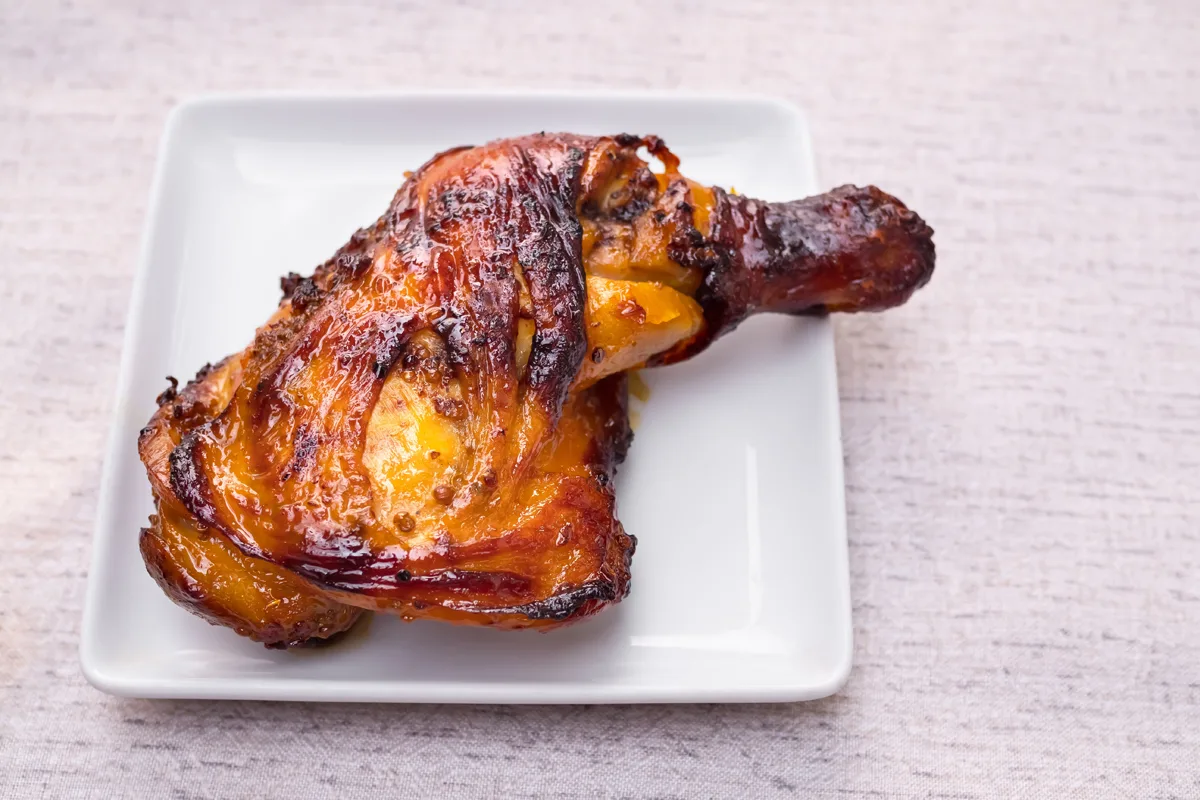Chicken is budget-friendly meat which is one of the reasons it is so popular.
Best of all, you can make many delicious meals with it and provide your family with a quality protein and nutrient-filled meal.
You can also use leftover chicken in many ways.
But when you’ve spent hours in the kitchen preparing Hawaiian BQQ chicken, BBQ chicken breast, or smoking a whole chicken in your offset smoker, it can be easy to forget how long that chicken has been sitting out.
Contents
How Long Can Cooked Chicken Sit Out
Whether it’s pulled pork, brisket, or BBQ shrimp, no food is safe if it’s left at room temperature for too long.
Typically, all cooked meats, including chicken, should never be left out for more than 2 hours.
Nevertheless, other factors play a role in the spoilage of chicken.
The maximum time cooked chicken can sit depends heavily on the room’s temperature.
The temperature danger zone ranges between 40°F and 140°F.
Therefore, if the chicken is left in the danger zone for more than 2 hours, so many bacteria will develop that the chicken is no longer safe to eat.
If you reside in tropical regions where the temperature is higher than 90°F, the cooked chicken can only sit outside for 1 hour.
Therefore, whether you are having a backyard BBQ or having dinner indoors, it’s essential to be mindful of the time the chicken is left out and the room’s temperature.
Can I Eat Chicken That Was Left Out Overnight
Unfortunately, some folks believe that if the cooked chicken is in an airtight container or covered with foil or plastic wrap that it is safe to leave it out overnight. However, this is simply a myth.
While new bacteria will not necessarily be introduced to the chicken’s exterior because it is covered, bacteria are still alive within the meat.
These bacteria can still grow and cause the cooked chicken to spoil within 2 hours.
The most common bacteria found on chicken are Escherichia coli (E.coli) and Salmonella. Both of these bacteria cause food poisoning.
That is why you should throw out any cooked chicken that sat out for more than 2 hours.
Another common misconception is that reheating chicken that sat out for more than 2 hours will neutralize the bacteria.
Unfortunately, if the bacteria has already released its toxins, heat will not neutralize those toxins, and you may still get sick.
How To Store Cooked Chicken
It’s frustrating to throw away leftover chicken from your party. This is why you should store your chicken properly to reduce food waste.
These storage guidelines will only work if you keep the chicken hot during the entirety of your party.
In contrast, if you cook the chicken for a weeknight meal, it’s best to store it once you’ve finished eating.
Let your chicken cool at room temperature for less than 2 hours.
You can divide the chicken into smaller pieces and place them into shallow food-safe containers to speed up the cooling process.
Do not place hot foods such as chicken in the refrigerator.
The hot food will increase the fridge’s ambient temperature and may even cause other foods in the fridge to spoil faster.
Once the chicken cools, cover the leftovers, and place them into the fridge.
Do not place raw chicken and cooked chicken on the same shelf.
Raw chicken contains more bacteria than cooked chicken, so it’s best to store them in different areas of the fridge to limit cross-contamination.
In addition to this, do not store the chicken near the door.
The fridge’s temperature drops every time the door is opened, which means if the cooked chicken is stored in the door or the front of the fridge, it will spoil faster.
Store the chicken at the back of the fridge so it can last for as long as possible.
Cooked chicken will only last in the refrigerator for 4 days.
How To Freeze Cooked Chicken
If you are not going to eat your leftover chicken within 4 days, it’s best to freeze it.
You can place the leftover chicken into freezer-safe containers or use freezer-safe ziplock bags. You can also use a vacuum sealer for packaging the leftover chicken.
If you are storing the chicken in a ziplock bag or vacuum sealer, press the excess air out of the chicken before sealing it.
In addition to this, it may be best to freeze the chicken in portions so you don’t have to thaw all of the cooked chicken just to remove a few pieces.
Make sure your freezer is at 0°F. This temperature will decrease bacterial growth, sending them into hibernation.
Label the cooked chicken with today’s date before placing the chicken in the freezer.
This way, you won’t have to guess when you placed the chicken in the freezer.
Do not store the cooked chicken in the freezer for too long. It’s best to use the chicken within 4 months.
After 4 months, the chicken’s flavor and texture will deteriorate.
Once you are ready to reheat your cooked chicken, thaw it in the fridge overnight. You can also thaw the chicken in the microwave or in cold water.
However, if you thaw cooked chicken in the microwave or cold water, you must use it immediately.
When reheating the chicken, make sure you reheat the chicken to 165°F.
You can monitor the chicken’s temperature with an infrared thermometer; it is the only way you can tell if the chicken is safe to consume.
Final Thoughts
Chicken is a flavorful, filling, and delicious meat.
But sometimes we forget to place it in the fridge, and other times we forget to monitor how long it’s been sitting out at room temperature.
Cooked chicken can only sit out of the fridge for 2 hours.
If the cooked chicken sits out any longer than 2 hours, it will become riddled with so many bacteria that it is dangerous to consume.
This is why you should always monitor how long cooked chicken sits out at room temperature.
You might also be interested in the following:
- How Long Can Cooked Beef Sit Out
- How Long Can Cooked Steak Sit Out
- How Long Can Cooked Pork Sit Out
- How Long Can Cooked Bacon Sit Out
- How Long Can Cooked Sausage Sit Out
- How Long Can Cooked Ground Beef Sit Out
- How Long Can Cooked Salmon Sit Out

I have been smoking and grilling meat from an early age and enjoy sharing my knowledge and expertise through the hundreds of articles I have written about BBQ. I hope to make everyone’s BBQ journey that little bit easier.

